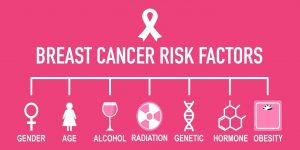
Image under license from shutterstock.com
Breast Cancer Risk Factors
Each type of breast cancer has the right treatment – and the choice of the most effective medical intervention for each type of tumor is made after examinations and an in-depth analysis of the patient’s clinical status.
Main Causes of Cancer
When we talk about breast cancer, many people associate its development with genetic and risk factors, such as women with a family history of cancer and factors such as advanced age. This information, however, does not mean a pre-established diagnosis of the disease, we cannot generalize, and each organism is particular and acts differently.
Here are some factors associated with an increased risk of breast cancer:
- Being a woman: although it is possible for men to have breast cancer, women are more likely to develop the disease;
- Personal history of breast conditions: there is an increased risk of cancer if lobular carcinoma in situ or atypical breast hyperplasia was previously found on biopsy;
- Personal history (History) of breast cancer: if the patient has already been diagnosed with breast cancer in one breast, there is a greater chance of the tumor developing in the other breast;
- Family history (Inheritance) of breast cancer: patients who have the disease in their family history are at greater risk of developing it as well;
- Inherited genes that increase the risk of cancer (Genetic mutation): Certain genetic mutations that increase the risk of breast cancer can be passed from parents to children. The best known are BRCA1 and BRCA2;
- Age advancement;
- Radiation exposure in chest treatments as a child or young adult;
- Obesity;
- Early first menstruation;
- Entry into menopause at an advanced age;
- Never having been pregnant or having had the first pregnancy after the age of 30;
- Use of post-menopausal hormone therapy medications;
- Consumption of alcoholic beverages.
Breast Cancer Prevention

Image under license from shutterstock.com
Although there is no proven effective prevention, there are many ways to reduce the risk of developing breast cancer! This attitude is especially important for women with certain precedents, such as a strong family history or genetic alterations.
How to prevent breast cancer
Unfortunately, medicine has not yet evolved to the point where we have a single solution for the prevention of breast cancer, as some risk factors cannot be controlled, such as genetics. However, we can take many preventive measures – some habits can cut the chances of developing the disease by half.
Preventive Prophylaxis of Breast Cancer
In some cases in which women are more likely to develop breast cancer, usually after studying their genetic factors, there is the possibility of removing breast tissues as a form of prophylaxis and prevention.
Called a preventive mastectomy or prophylactic double mastectomy, this medical intervention reduces the risk of developing cancer by approximately 90%.
Mammography for early diagnosis
Breast cancer diagnosed at an early stage has up to a 95% chance of cure. Therefore, it is extremely important to be up to date with routine exams and, for women over 40, to have a preventive mammogram annually – it is considered one of the most effective procedures in the early detection of breast cancer.
Foods Considered at Risk
Some studies indicate that there is a link between breast cancer and the consumption of large amounts of fat. According to researchers on the subject, high consumption of fat, especially saturated fat, is linked to an increased risk of breast cancer.
Original article accessed at: https://mulherconsciente.com.br/cancer-de-mama/tudo-sobre-o-cancer-de-mama/#tipos-cancer-inicial, accessed on August 2022.
References:
- National Comprehensive Cancer Network (NCCN) Clinical Practice Guidelines for Breast Cancer Screening and Diagnostic. Available at www.nccn.org. Last accessed on July 2024.
- Symptoms & Diagnosis of Breast Cancer. Breastcancer.org Foundation. Available at www.breastcancer.org/symptoms. Last accessed on July 2024.
- Symptoms & Diagnosis of Breast Cancer. Breastcancer.org Foundation. Available at www.breastcancer.org/symptoms/testing. Last accessed on July 2024.
- Causes, risk factors, and prevention. American Cancer Society. Available at http://www.cancer.org/cancer/breastcancer/detailedguide/breast-cancer-risk-factors. Last accessed on July 2024.
